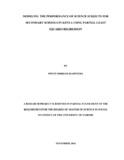| dc.contributor.author | Karwitha, Mwiti Mirriam | |
| dc.date.accessioned | 2017-01-10T05:40:34Z | |
| dc.date.available | 2017-01-10T05:40:34Z | |
| dc.date.issued | 2016 | |
| dc.identifier.uri | http://hdl.handle.net/11295/100054 | |
| dc.description.abstract | Students’ performance in sciences is closely associated with the scientific and technological innovations worldwide. The Government of Kenya recognizes the important role science must play in achieving “Vision 2030” and invest resources in raising the quality of teaching mathematic science and technology. English, a second language in Kenya communities is the language of instruction and assessment in schools. As the social sciences develop, hypothesized relationships become increasingly more complex, therefore the need to use more versatile models. Partial Least Square Regression is one of those models. The purpose of the study was to investigate the effect of learners’ achievement in literacy on the performance in science subjects. From the study it can be concluded that both mathematics and languages contribute highly in the development of science process skills. The study recommends that other than focusing on mathematics and sciences, they should also focus on the development of literacy skills in English and Kiswahili. Policy-makers should also consider planning for capacity development trainings for English and Kiswahili. | en_US |
| dc.language.iso | en | en_US |
| dc.publisher | University Of Nairobi | en_US |
| dc.rights | Attribution-NonCommercial-NoDerivs 3.0 United States | * |
| dc.rights.uri | http://creativecommons.org/licenses/by-nc-nd/3.0/us/ | * |
| dc.title | Modeling The Performance Of Science Subjects For Secondary Schools In Kenya Using Partial Least Squares Regression | en_US |
| dc.type | Thesis | en_US |



